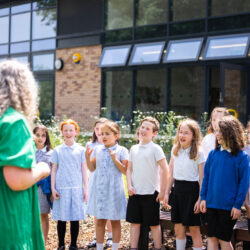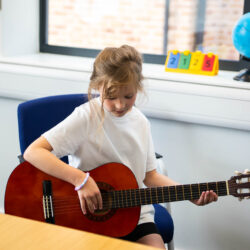| At Overdale Junior School, the music curriculum is designed to inspire and nurture every child’s unique talents and creative potential. Through a rich and varied programme, we aim to develop pupils’ musical skills while fostering a lifelong appreciation for the art of sound.
The intention behind our curriculum is to:
|
Music
| At Overdale Junior School, music is delivered through a dynamic and inclusive programme that ensures all pupils have regular opportunities to engage, perform, and progress. Our curriculum is carefully structured to meet national expectations while celebrating the joy and creativity of musical learning.
We implement our music curriculum through: · Weekly class lessons taught by the class teacher using the LeicMusic scheme of work, which provides comprehensive coverage of all areas of music learning and aligns with current government guidance. · A weekly whole-school singing assembly, fostering community spirit, vocal development, and collective enjoyment of music. · A range of after-school and lunchtime music clubs, offering enrichment opportunities for pupils to explore instruments, genres, and performance in a more informal setting. · The integration of music technology, allowing pupils to experiment with digital composition, sound editing, and modern production tools. · Access to peripatetic instrumental tuition during the school day, enabling children to receive specialist instruction in a variety of instruments and further develop their individual musical talents. |
This multifaceted approach ensures that music is not only embedded in the curriculum but also woven into the wider life of the school, supporting pupils’ personal development, confidence, and cross-curricular learning.
Our Music Lead is Miss Mays.

OJS Music Development Plan For Website 2024
Y3 Music KO – Autumn 1 – 20th Century Music
Y4 Music KO – Autumn 1 – 20th Century Music
Y5 Music KO – Autumn 1 – 20th Century Music
Y6 Music KO – Autumn 1 – 20th Century Music
Y3 Music KO – Autumn 2 – Technology And Structure Unit 5
Y4 Music KO – Autumn 2 – Pulse BRASS
Y3 Music KO – Spring 1 – Pulse RECORDER
Y4 Music KO – Spring 1 – Rhythm BRASS
Year 5 Music KO – Spring 1 – Technology, Structure And Form
Year 3 Music KO – Spring 2 – Rhythm
Y4 Music KO – Spring 2 – Pitch
Y5 Music KO – Spring 2 – Rhythm
Y6 Music KO – Spring 2 – Pitch
Y3 Music KO – Summer 1 – Pitch
Y4 Music KO – Summer 1 – Voice
Y5 Music KO – Summer 1 – Pitch
Y6 Music KO – Summer 1 – Rhythm

